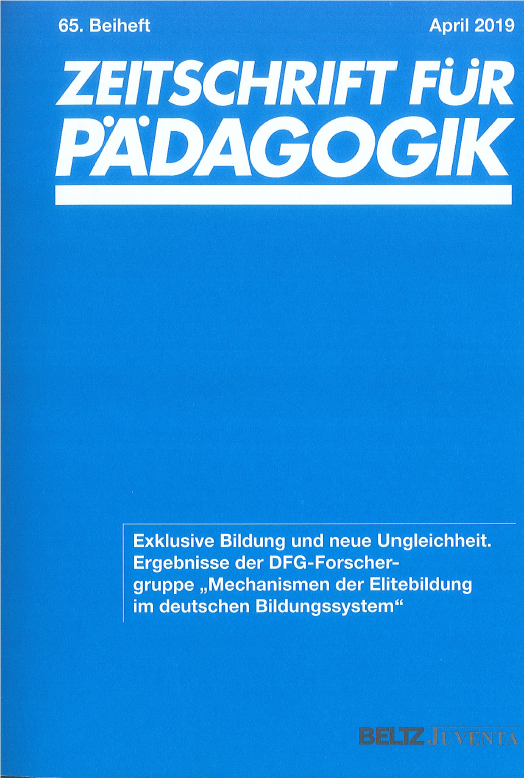
News of FOR1612
Abschlussbericht eingereicht
Im September 2020 wurde der Abschlussbericht der FOR1612 bei der DFG eingereicht. Eine Veröffentlichung als Werkstattheft ist geplant.
Abendvortrag Heinz-Elmar Tenorth 02.07.2019
Am 02.07.2019, 18.15-19.45 Uhr wird Prof. Dr. Dr. h.c. Heinz-Elmar Tenorth (Humboldt Universität zu Berlin) im Großen Konferenzraum des Zentrum für Schul- und Bildungsforschung (ZSB) einen Vortrag mit dem Titel „Internate - die Maschinerie des Pädagogischen“ halten.
Vor dem Hintergrund ihrer Geschichte in Europa und den USA diskutiert der Vortrag Internate und boarding schools als exemplarische Form des Pädagogischen. Dabei wird erörtert, wie die Internate, einerseits, die Zentralprobleme einer jeden Pädagogik bearbeiten, wie sie zwischen der bedrohlichen Natur der Zöglinge und der Konstruktion von 'Wohlerzogenheit' bestehen, und wie sie, andererseits, die Erwartungen ihrer Klientel, v.a. die Konstruktion von Eliten, im Wandel der Zeit und in der Differenz der Kulturen semantisch und operativ aufnehmen. Bemerkungen zu Leistung und Wirkung von Internaten stehen am Schluss dieses zugleich erstaunten wie skeptischen Blicks auf eine wohl funktionierende Bildungsmaschine.
Schwerpunktteil der ZQF
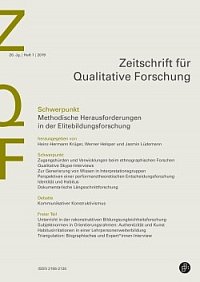
https://www.budrich-journals.de/index.php/zqf/issue/view/2508
Beiheft der ZfPäd
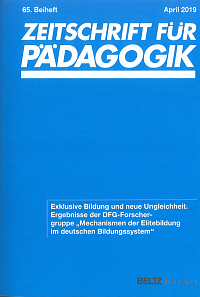
Abendvortrag Steffen Mau 21.11.2018
Abendvortrag Jochen Kade 22.10.2018
Längsschnittworkshop 22.-23.10.2018
Vortrag: „Private Schulen: Alternative zu dem staatlichen Schulsystem? Entwicklungen und empirische Ergebnisse.“
Abendvortrag Prof. Dr. Martina Löw
Zeitungsartikel
Two new publications
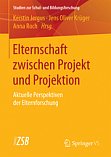
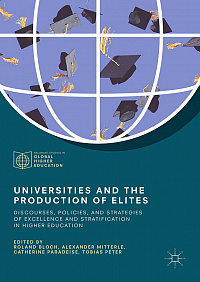
Flyer Universities and the Production of Elites
Flyer Universities and the production of elites.pdf
(309.1 KB) vom 30.10.2017
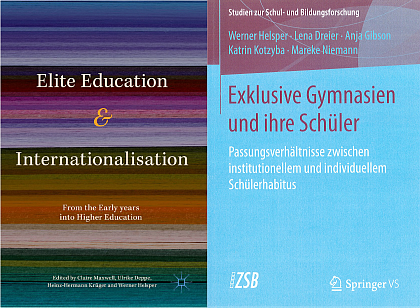
Front pages
Flyer Exclusive Gymnasien
Flyer_exkl_gym.pdf
(267.4 KB) vom 14.06.2017
Flyer Elite Education
Maxwell et al_Flyer.pdf
(382.5 KB) vom 14.06.2017
International Final Conference
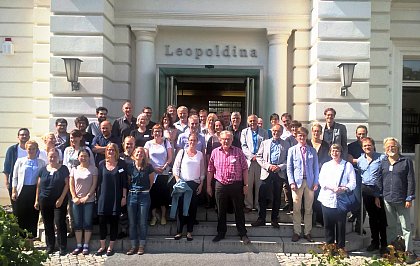
New Stratifications in the Education System? National and International Developments from Kindergarten to University
The conference is planned to provide a synopsis of mechanisms of elite formation, with special regard given to processes of horizontal differentiation and forms of hierarchysation – i.e. choice, selection, distinction and formation of coherency – and their relevance to the educational system, its institutions and actors. On one hand, the conference will try to answer the question if – and, how – new horizontal stratifications emerge in different parts of the educational system. On the other hand, the interplay between different mechanisms and their role in establishing exclusive stratifications in educational fields will be focussed. However, we do not assume that a horizontal differentiation (formation of hierarchies between ECEC, Primary Education, Secondary Education/German ‘Gymnasium’ and Higher Education) affects all educational sectors in the same mode. More likely, the outreach and validity of the hypothesis is to be further examined, differentiated and (if necessary) revised. Our aim is to frame and reflect the tendencies, made accessible for the first time through our continuous research in various areas of the German educational system, comprehensively and in the context of international developments.
Conference program
tagungsprogramm2017_for1612.pdf
(248.7 KB) vom 30.05.2017
Evening lecture Prof. Dr. Reinhold Sackmann (Martin-Luther-University Halle-Wittenberg), February 14th 2017
On February 14th 2017, Prof. Dr. Reinhold Sackmann gave a lecture on „How to Strengthen Elite and How to Break Elite Power. Mechanisms of Elite Formation in the Education System“.
Since 2004 Reinhold Sackmann holds a chair in Sociology at the Martin-Luther-University Halle-Wittenberg. His research concentrates on the sociology of life course, generations, demography, education and employment. In one of his current research projects he concentrates on the choice of institutions of higher education in Germany and France and asks if it leads to a vertical differntiation within the field of higher educational institutions, making him an important cooperation partner of the research group „Mechanisms of Elite Formation in the German Educational System“.
In his lecture he identified four main elements of said mechanisms, namely the parental and/or young adults choosing of educational institutions, the selection procedures of educational institutions, the perception of distinction and the creation of coherence.
Workshop „Interplaying Mechanisms“
The mechanisms of Choice, Selection, Distinction and Coherence serve as an heuristic for the research group. The internal workshop started with a lecture of professor Reinhold Sackmann on the 14th of February 2017 (see above). On the following day the workshop continued using a method called „world café“ leading to productive discussions among the participants. Presenting their specific views on the topic carried by their respective empirical reconstruction, researchers of the six research projects got a chance to discuss various angles in an attempt to indetify divergent dimensions within the mechanisms. The workshop was meant to secure the results oft he research group.
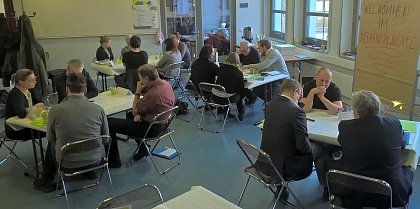
Fascinating science and precarious employment conditions
Topic in the journal of Educational Science
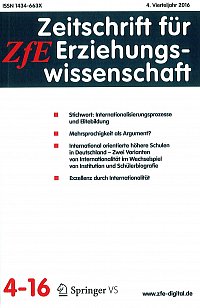
Evening lecture Prof. Dr. Hartmut Rosa (University of Jena), November 21st 2016
On November 21st 2016, Prof. Dr. Hartmut Rosa gave a lecture on “School as a space for resonance or zone of alienation. A socio-structural essay” at the Center for School and Educational Research (ZSB).
Hartmut Rosa is a professor of general and theoretical sociology at Friedrich Schiller University of Jena. Professor Rosa’s work includes topics such as normative and empirical foundations of social criticism; theories of the subject and identity; sociology of time and theory of social acceleration.
Guest lecture Dr. Isabell Stamm, October 6th 2016
On October 6th 2016, 5.30 – 7.00 p.m., Dr. Isabell Stamm gave a lecture entitled “Socialised into being entrepreneur. How entrepreneurial families narrate themselves” at the Center for School and Educational Research (ZSB).
Dr. Isabell Stamm has worked as a researcher (post-doc) at the Department for Sociology at University of California, Berkeley. Currently, she is leading a research group on “Entrepreneurial Group Dynamics” at Technische Universität Berlin, funded by a Freigeist-Fellowship of the Volkswagen Foundation. Her general research focuses are intertwinement of work and family, entrepreneurial groups and methods in cooperative research.
In her lecture at ZSB, Isabell Stamm drew from her dissertation project (Dr. phil.) on entrepreneurial families , whose “whole life” is regarded. Concepts such as life course development, biography as well as their day-to-day lives are guiding principles in her project.
Research group’s summer school with Prof. Dr. David James (University of Cardiff), 6th – 7th July 2016
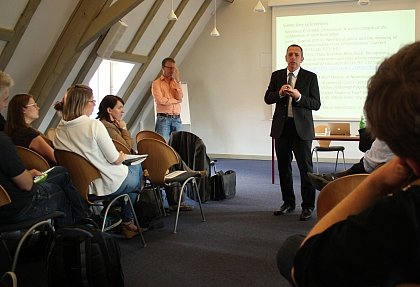
Paper of Prof. Dr. David James
Within the research groups’ summer school 2016, Prof. Dr. David James gave a talk on current findings of his research (open for all university members). Moreover, there has been an internal roundtable for projects of the ZSB’s research group, as well as a workshop on specific matters with several of the research group’s projects.
David James is a professor and director at ESRC Wales Doctoral Training Centre at University of Cardiff (UK). His research focuses chiefly on the field of education and social inequality. Within his research he has primarily employed qualitative methods of social research. In the area of higher education, Professor James has carried out research on evaluation and experiences of students; professionalization and cultures of learning; school choice and ‘middle-class identity’.
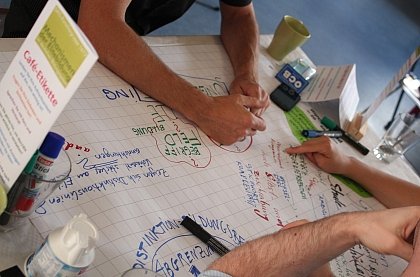
Picture of the world cafe
Evening lecture Prof. Thomas Klatetzki (University of Siegen), April 18th
2016, 18.15 – 19.45 h
On April 18th 2016 Prof. Thomas Klatetzki gave a lecture on “Narrative practices. The organization of human services“ at the Center for School and Educational Research (ZSB).
Thomas Klatezki is a professor of organizational sociology at University of Siegen. His research concentrates on interactionist theory of organization and includes theoretic sociological perspectives on the description of organizations.
Symposium “Exclusive educational spaces. Processes of internationalization in the German education system” at DGfE Congress 2016 in Kassel, March 16th 2016, 10.00 – 13.00 h (Prof. Krüger/Prof. Helsper)
The symposium seeks to analyze how processes of internationalization and globalization in the education system worldwide – represented by notions as ‘international educational monitoring’, new strategies of ‘New Public Management’ and the implementation of global educational markets, schools and courses of study – have an impact on the reshaping of Germany’s education system. We argue that, aside from trends of social inclusion, a notable increase in processes of vertical differentiation within individual educational programs, as well as the establishment of exclusive educational spaces, can currently be observed in German education. Expanding and newly founded bilingual elementary/high schools (‘Gymnasium’), which additionally proffer international school leaving certificates, can be referred to as indicators of those processes. In higher education, movements of distinction and vertical differentiation between universities/colleges can be considered a result of the German Universities Excellence Initiative while ‘internationality’ – with reference to international publications and a multinational body of students – serves as a major keyword for institutions of higher education. With regards to this background, the symposium (four presentations; one comment) aims at discussing the way in which processes of internationalization change Germany’s educational spaces on a national, regional and local level; at questioning the extent to what processes of internationalization become the key principle within claims of exclusive educational institutions; and at examining parents’ and adolescents’ association with these matters. The presentations primarily rely on central findings of projects within a research group funded by German Research Foundation.
In the light of theories of space, the contributions refer to sociological macro theorems for an analysis of the societal contexts of educational spaces. These macro level approaches are combined with microsociological concepts that emphasize the social construction of spaces by the stakeholders themselves.
List of contributions:
- Bernd Zymek (comment) “How processes of internationalization change Germany’s educational system“
- Isabel Dean, Anna Roch & Jens Oliver Krüger “Exclusiveness through multilingualism? Negotiations of internationality in the discourses on elementary school choice in Berlin“
- Lena Dreier, Werner Helsper, Catharina I. Keßler, Stephanie Kreuz, Heinz-Hermann Krüger & Mareke Niemann “Internationally profiled schools as ‘exclusive’ educational spaces for pupils’ habitus”
- Roland Bloch, Alexander Mitterle & Tobias Peter “Demarcations of excellence. Internationality as a keyword for vertical differentiation in German higher education”
Processes of Internationalization and Elite Formation
The second international conference of the DFG research group ‘Mechanisms of Elite Formation in the German Educational System’ was held from 19th - 22nd October, 2015 at the Leucora in Wittenberg. Following the conference’s topic “Processes of Internationalization and Elite Formation – Challenges and Effects”, processes of internationalization and globalization in educational systems were discussed with regard to the challenges and effects that these processes impose on national systems of elite formation and their stakeholders.
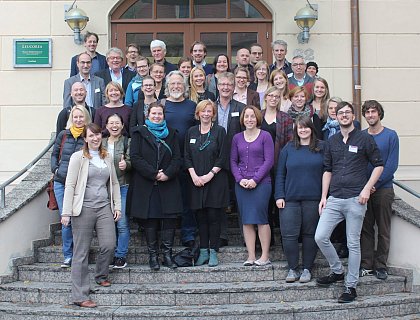
Second international conference 2015
Apart from theoretical lectures by Michael Hartmann (University of Darmstadt) on the internationality of elites and the role of institutions of elite formation and Richard Münch’s (University of Bamberg) lecture on education and schooling in international competition, Tobias Peter (University of Freiburg) and David Baker (Pennsylvania State University, USA) raised extensive perspectives on internationality, excellence and elite formation in national and international comparisons. Peter focused on “Exclusive Globality, inclusive Diversity – Facets of Internationality in the contemporary Educational Discourse in Germany“; Baker gave a paper entitled "Where Have All the Elites Gone? The Social Construction of Meritocracy in the Schooled Society”.
Empirical contributions reached from trends of internationalization in early childhood education and care (Johanna Mierendorff and Thilo Ernst); over a case study of global parenthood in Berlin’s international schools (Georg Breidenstein, Anna Roch and Fenna La Gro); to internationalization in secondary ‘Gymnasium’ education in East and West Germany in Werner Helsper, Lena Dreier, Mareke Niemann’s paper and Heinz-Hermann Krüger and Catharina Keßler’s paper, the latter referring to the example of an international school and it’s pupils with special regard to the concept of ‘world citizenship’.
International and comparative contributions by Jane Kenway (Monash University, Australia) on the topic “The emotional life of markets in elite secondary schooling in the Global South“; Mary Hayden’s (University of Bath, UK) paper on “International schools and their students: changes and challenges“; and Claire Maxwell’s (University College of London, UK) talk on “Reaching out beyond the shores. English elite education – then and now” opened a wider view on discourses of internationalization in England and the global field as well as the desiderata yet pertaining to that area of research.
In the last thematic set dedicated to higher education, Roland Bloch and Alexander Mitterle looked at processes of internationalization and stratification in the field of higher education. This perspective was rounded with a view on French elite colleges in the context of internationalization provided by Anne Schippling (University of Lissabon).
Following a concluding lecture on cross perspectives of trends of internationalization within the German educational system and institutions of elite formation by the research group’s key project (Ulrike Deppe, Jasmin Lüdemann and Heiko Kastner), the intersections of processes of internationalization and elite formation were approached in a final discussion.
Workshop and lecture with Helene Aarseth
Helene Aarseth delivered a lecture entitled “Prepared for the race? Financial elite families and egalitarian schooling in Norway” on November 9th 2015. Beyond that she did a workshop in the framework of equalization.
Helene Aarseth is Research Director of the Norwegian Social Research Oslo and Akershus University College of Applied Science (NOVA). Because of her study „Family cultures in the business elite“, about Norwegian financial elite families with reference to the egalitarian school system in Norway, topical connections are given to our research group.
Evening Lecture “Social inequality
beyond the nation-state"
On July 8th, 2015 Joanna Jadwiga Sienkiewicz, M.A. and Dipl. Soz. Karolina Barglowski (University of Bielefeld) delivered a lecture in the Great Conference Room of the Center for School and Educational Research. In their lecture, entitled “Social inequality beyond the nation-state: reports from the ‘C-column’ of the Collaborative Research Center 882“, they spoke about the Collaborative Research Center in general and about selected results concering issues of tansnationality and social unequality. The Collaborative Research Center (‘Sonderforschungsbereich’) with the title “From Heterogeneities to Inequalities” involves more than fifty researchers of the Univesity of Bielefeld, the German Institute for Economic Research (DIW) in Berlin and the University of Erlangen-Nuremberg. The project aims to integrate up until now rarely connected perspectives of research in social unequality such as labor market, gender, education, justice and migration (https://sfb882.uni-bielefeld.de/sites/default/files/SFB_882_brochure.pdf ).
Joanna Jadwiga Sienkiewicz and Karolina Barglowski are both research associates in the project C3 “Transnationality, the Distribution of Informal Social Security and Inequalities“, lead by Prof. Dr. Thomas Faist (PhD, Faculty of Sociology, University of Bielefeld). The question guiding the project’s research ist how transnationality influences the distribution of informal social security (particularly: childcare, care of diseased relatives, remittances, supports for integration and job placements; for further information: https://sfb882.uni-bielefeld.de/sites/default/files/Project_C3.pdf ).
Visiting guest Dr. Ricieri Carlini Zorzal (Federal University of Maranhao)
Postdocotral research fellow Ricieri Carlini Zorzal has been awarded a scholarship by the Brasil government within the scope of a scietific program. His visit at the Center for School and Educational Research started in June 2015 and is, to ensure all requirements for a successful research stay, scheduled for up until June 2016.
Under the working title „Exploring musical teaching strategies: An observational study in acoustic guitar master-classes“ he analyzes acoustic guitar master-classes in the context of brasilian music festivals. Central to his research is the question of the strategies used and how they are applied within teaching.
Interviews with musicians, as well as audio and video recordings, serve as empirical data sets. Additionally, quantitative data concerning the master-classes was collected.
Ricieri Carlini Zorzal hopes for an active interchange in regard to method(olog)ical and theoretic issues through cooperation with the research group 1612. Further, his aim is to publicize scientific papers in journals in a German context, possibly together with other members of the research group.
Methods workshop of the research group 1612 in April 2015
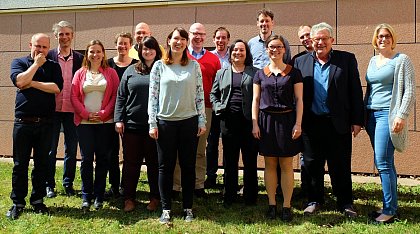
Methods workshop 2015
During a three-day-workshop on different research methods of the research group from the 22nd to the 24th of April 2015 there were a couple of public lectures. The possibility to acquaint oneself with qualitative evaluation procedures were given during internal parts of the workshop. Empirical material of the research group’s sub-projects were interpreted in plenary.
The opening lecture was presented by Prof. Dr. Robert Schmidt (University of Eichstätt-Ingolstadt) on „Methodological Challenges of a Sociology of Practics“ on the 22nd of April from 5.00 to 6.30 p.m. in the English Hall of the Francke Foundations.
On the 23rd of April (10.45-12.15a.m.), Prof. Dr. Rolf-Torsten Kramer (Martin Luther University Halle-Wittenberg) was talking about „Analysis of the Habitus in Longitudinal Analysis, Documentary Method and Sequence Analytic Habitus Reconstruction“. This also took place in the English Hall of the Francke Foundations. Afterwards, an internal workshop with Prof. Kramer and the members of the research group followed. For interested members of the ZSB team, members of the doctoral study course and students of the faculty of educational science were welcome to participate. The empirical material of the subprojects 4 and 5 were analysed and discussed. (13.00-14.30: SP 4, 14.45-16.15: SP 5, Large Conference Hall of the ZSB)
Afterwards Dr. phil. Till Jansen (University of Witten/Herdecke) presented a paper about „Polydimensional Reconstruction – Organisational Research in Complex Settings“ from 4.45 to 6.15 p.m. at the English Hall of the Francke Foundations. The associated internal workshop and the analysis of the material of subproject 1, 2 and 6 were analysed on the next day. (9.00-11.30: SP 1, 10.45-12.15: SP 2, 13.00-14.30: SP 6, Large Conference Hall of the ZSB)
The series were completed by the paper of Prof. Dr. Fabian Kessl (University of Duisburg/Essen) from 2.45 to 4.15 p.m. in the Large Conference Hall of the ZSB. He talked about „Space and Spatiality in Educational Research“. Finally there were the internal workshop with Prof. Dr. Kessl and the subproject 3 (16.30-18.00: SP 3, Large Conference Hall of the ZSB).
The lectures of Prof. Dr. Robert Schmidt, Prof. Dr. Ralf-Torsten Kramer, Dr. phil. Till Jansen, Prof. Dr. Fabian Kessl were open to all interested persons.
Visiting guest Dr. Susanne Dodillet
Dr. Susanne Dodillet was a guest of the research group 1612 for three months from april to july 2015. Since 2010 Dr. Susanne Dodillet has been working as a research assistant at the institute for pedagogics and special education at the university of Göteborg. Her research focus lies mainly on the cultural comparison between Germany and Sweden. Elite formation and initiatives of excellence are topics in which the cultural, political and academically climate of the two countries differs. In the recent project she was analyzing the history of ideas of elite formation and initiatives of excellence in Sweden, West Germany and East Germany since World War II with the title “How to explain excellence programs. A comparing history of education policies and research in Sweden, East and West Germany since 1945”.
Main Part of the Journal for Pedagogics
In the main part of edition 1 of the journal for pedagogics (January/February 2015) can be found a variety of articles written by the sub-projects of the research group. By linking results within and across the project they present the specifics of selection processes in educational institutions from different perspectives. After the publication of the special edition 19-2014 of the Zeitschrift für Erziehungswissenschaften with the title 'Elite and Excellence in the Educational System' the FOR1612 provides a second extensive journal publication.
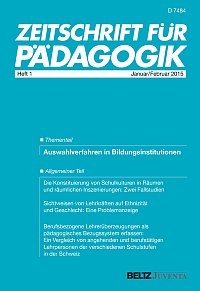
Cover ZfPäd
Lecture and Roundtable with Dr. Agnès van Zanten
On 23.09.2014 Dr. Agnés van Zanten was giving an open lecture about „The education of elites in France: the combined effect of family and institutional sponsorship“ at the conference room of the Center for School and Educational Research (ZSB) as part of the 3rd International Summer School of the research group „Mechanisms of Elite Formation in the German Educational System“. Agnès van Zanten is Directrice de Recherche at the Observatoire Sociologique du Changement (OSC) at the Centre National de la Recherche Scientifique (CNRS) of the Science Po, Paris in France. Her research focus has been elite formation in high school and college/university in France and internationally for a long time. She was concentrating on school choice, policy and institution analysis.
After the lecture there was an open roundtable to get into conversation about further and own research prospects as well as more in-depth aspects and information. In the remaining time from September, 23rd till 24th Agnès van Zanten was elaborating comparative perspectives in cooperation with the research group projects about „Institutional selection processes in France and Germany“.
Research group „Mechanism of Elite
Formation in the German Educational
System“ extended by three years
The DFG (German Research Foundation)-research group 1612 „Mechanism of Elite Formation in the German Educational System“ is renewed for a three-year period from october 2014 till september 2017 after positive assesment of the DFG- senate. Six of the extended projects are located at the University of Halle, five of them at the Center for School and Educational Research (ZSB), one sub-project ist located at the University of Freiburg. Coordinator of the research group is Prof. Dr. Werner Helsper and vice-coordinator is Prof. Dr. Heinz-Hermann Krüger. Furthermore Prof. Dr. Johanna Mierendorff, Prof. Dr. Georg Breidenstein, Prof. Dr. Manfred Stock, Prof. Dr. Reinhard Kreckel and Prof. Ulrich Bröckling (University of Freiburg) are taking part with additional sub-projects. The third-party founding at the University of Halle amounts to 2.2 Million Euro for the next three years.
The research group examines processes of social construction and creation of elite and excellence in main educational institutions and venues from preschool to Unsiverity and their impact on recipients and professionals in Germany. As part of the cooperation across projects especially implementation and defussiveness of the semantics elite and excellence on different levels and departments of the educational system, as well as selection criteria and selective practices at educational transitions were investigated in the first stage of founding. The now granted second founding phase is intended to examine mechanisms of distiction and creation of coherence in processes of choice and selection, the transition of discourses about excellence and equality, as well as the landscape of exclusive educational insitutions in time comparison, changes of selection strategies and educational guidance of parents with preschool and elemantary school-aged children, as well as educational carreers of adolescents on the way from exclusive schools to universities in a longitudinal perspective. Outcomes will provide information about the dynamics of elite formation in time comparison, selection processes and conflicts in a longitudinal perspective, about early educational carreers of elite, as well as repercussion of these processes to the entire educational system.
Lecture and workshop with Claire Maxwell
Claire Maxwell delivered a lecture about her study "Private and elite education in England - creating privileged subjects" on July 08th 2014. She also attended a round table the same day with everyone interested of the research group, members of the ZSB and the faculty. Beyond that she did a workshop in the framework of equalization.
Claire Maxwell is a Senior Lecturer for Sociology of Education at the Institute of Education, University of London. Because of her longitudinal study "Top girls: middle class privilege and agentic practice”, where she examined young women/students attending four private schools in the South of England, topical connections are given to our research group.
Attendency at the DGfE-congress 12.03.2014 at the Humboldt-University Berlin
Research panel FF 05 DOR24 – 1.102:
“Elite” and “Excellence” in the German Educational System: Discourse and perspectives of the protagonists
Prof. Dr. Heinz-Hermann Krüger (Halle/Saale), Prof. Dr. Georg Breidenstein (Halle/Saale)
Excellence initiative, clusters of excellence, elite universities, prime-schools, promotion of highly talented students, competition for the minds etc.: That kind of terms in the semantic field of elite and excellence are common by now. In the semantic field of “elite” and “excellence” an array of controversy, distinction, identification and promise is established and modelled. Not just educational policy, scientific and feuilletonistic agreements, also institutional connections and discursive allocation talk about the relevance of unfinished and inconsistent tags around “elite” and “excellence”. In this research panel initial findings of some of the research projects of the DFG- research group “Mechanisms of Elite Formation in German Educational System” about the discourse and perspectives of the protagonists about elite and excellence were presented.
Work group AG III 72 UdL6 – Audimax:
New inequalities between educational insitutions? Horizontal and vertical differentation processes in the German educational system
Prof. Dr. Werner Helsper (Halle/Saale), Dr. Manfred Stock (Halle/Saale)
Horizontal inequalities between educational institutions are far from new. But shifts are indicated, that contribute to stronger distinctions between educational institutions at the same level as the educational system. The thesis of verticalization on the horizontal level, reinforcement of competitive actions, as well as the tendency to market-like segments of the educational system were discussed on the base of empirical findings. To do so developments in elementary education, higher school education and college education were taken into account and connected with surveys of the educational system. Major issue was the question: Is the future of education characterized by simultaneity of equalization and distinctive-exclusive disparity?”
Mentoring
On the 30th of January 2014 the first event of the internal mentoring within the framework of equalization of the research group took place. Female researchers are able to look voluntarily for a mentor in any country. They can exchange views consistently on their academic career and obtain assistance for their research focus. The program provides support and advice for expanding contacts.
Prof. Dr. Johanna Mierendorff and Dr. Ulrike Deppe gave a brief introduction to the program during the first three-hour meeting. They also surveyed needs and wishes of all attendees in a nonchalant atmosphere.
Podiumsdiskussion zum Thema
"Privatisierung des Schulwesens und
Auswirkungen auf Bildungsräume"
Am 11.10.2013 von 10.45 bis 12.00 Uhr organisierte die DFG-Forschergruppe 1612 im Rahmen der Pädagogischen Woche des Fachbereiches Erziehungswissenschaften eine Podiumsdiskussion zum Thema "Privatisierung des Schulwesens und Auswirkungen auf Bildungsräume". Zusammen mit dem Privatschulexperten Prof. Dr. Heiner Ulrich und Schulleitern von drei halleschen Privatschulen aller Bildungsstufen ging man unter Moderation von Prof. Dr. em. Hartmut Wenzel der Frage nach, in welcher Form die zunehmende Zahl von Privatschulen die regionale Bildungslandschaft beeinflusst. Im Vorfeld gab es ab 9.00 Uhr einen Vortrag von Prof. Dr. Bellmann zum Thema "A tide that fits all boats? Neue Steuerung im Schulsystem und die Nachfrage nach Exzellenz".
Symposium „Exklusive Bildungs-Räume“ der
Forschergruppe im Rahmen der
Pädagogischen Woche
Die vier am Zentrum für Schul- und Bildungsforschung angesiedelten der insgesamt sechs zugehörigen Forschungsprojekte der Forschergruppe „Mechanismen der Elitebildung im deutschen Bildungssystem“ stellten sich der Erziehungswissenschaftlichen Fakultät und den Franckeschen Stiftungen mit ihren konzeptionellen Grundlagen und ersten Ergebnisse aus ihrer bislang zweijährigen Forschungsarbeit vor. Am Mittwoch, dem 09.10.2013 von 9 bis 12 Uhr, hielten die MitarbeiterInnen der Projekte „Elementare Bildung und Distinktion“, „Exzellenz im Primarbereich“, „Distinktion im Gymnasialen?“ sowie das Projekt „Exklusive Bildungskarrieren und der Stellenwert von Peerkulturen“ Vorträge, in denen sie den Fragen nachgingen, ob und wie Prozesse der institutionellen Ausdifferenzierung, Stratifikation und Distinktion im Elementar-, im Grundschul- und im Gymnasialbereich zu exklusiven Bildungsräumen führen und inwieweit Vorstellungen und Deutungsmuster von Elite und Exzellenz die Bildungsstrategien bzw. die Bildungsorientierungen von Eltern sowie Kindern und Jugendlichen beeinflussen.
Internationale Tagung zu „Elite and Excellence“
Vom 29.07. bis zum 01.08.2013 wurden in der Leucorea, Wittenberg erste Ergebnisse der Teilprojekte präsentiert und mit internationalen wie nationalen Vertretern aus dem Forschungsfeldern erörtert. Mehrere namhafte Forscherinnen waren unseren Vortragsanfragen gefolgt, darunter Gerlinde Mautner (AUT), Ingela Naumann (GB), Jan Nespor (USA), Martin Forsey (AUS), Florian Waldow (Münster), Annabelle Allouch (FR) und Heiner Ullrich (Mainz). Die Veranstaltung war als Arbeitstagung konzipiert.
Gleichstellungsworkshop
Am 10. und 26.06.13 fand ein Workshop im Rahmen der Gleichstellungsmaßnahmen zum Thema „Zeit- und Selbstmanagement“ statt. In einem ersten Teil erfolgte eine allgemeine Einführung in die Thematik mit begrifflichen Bestimmungen, generellen Zielen und Motivationen, strukturierter Reflexion und Anregung zu Zeitinventur. Die Zeitinventuren wurden in einem zweiten Teil individuell und in Kleingruppen bearbeitet.
Workshop zum Thema Anwahl
Vom 15.-16.05.2013 fand der zweite ergebnisvernetzende Workshop der FOR 1612 im ZSB statt. Thematisch zentral für den Workshop war die Frage nach den Anwahlprozessen und Anwahlstrategien der Bildungseinrichtungen aufseiten der Eltern bzw. der Adressaten selbst (Schüler, Studierende etc.). Die im Antrag dazu formulierte Fragestellung dazu lautete: Wie beeinflussen normative Vorstellungen und Deutungsmuster, die mit Exzellenz in Verbindung stehen, die Bildungsstrategien von Eltern aus gehobenen sozialen Milieus mit Kindern im Vorschul- und Grundschulalter sowie die bildungsbiografischen Entwürfe von Jugendlichen in den exklusiven Bildungsinstitutionen auf den verschiedenen Stufen des Bildungssystems und in welche Praktiken der Distinktion und Kohärenzherstellung sind sie eingebunden? Damit wurde eine weitere der sechs zentralen im Rahmenantrag formulierten Fragen der Forschergruppe bearbeitet. Über die Präsentation von Thesenpapieren brachten die Teilprojekte ihren aktuellen Wissenstand zur Thematik in die Gruppe ein. Anschließend beschäftigten sich Arbeitsgruppen mit den Anwahl-Faktoren: räumliche Mobilität, Wechselwirkungen zwischen Anwahl und Auswahl, dem Prozessmodell der Anwahl und den Entscheidungsakteuren im Prozess. Den Abschluss bildete eine Präsentation der in den Gruppen erarbeiteten Systematisierungen in Posterform.
Vortragsreihe „Neue Befunde zu Bildung
und Exzellenz“ im Rahmen der
Forschergruppe im SoSe 2013
15.05. 10 Uhr: Dr. Tanja Betz, Juniorprofessorin für Professionalisierung im Elementar- und Primarbereich an der Goethe-Universität Frankfurt am Main hat im Rahmen des Anwahlworkshops der Forschergruppe einen Vortrag über Ergebnisse ihrer aktuellen Studie „Leitbilder ‚guter Kindheit‘ und ungleiches Kinderleben - Bildung, Betreuung und Erziehung aus der Perspektive der Politik, der Professionellen in Kindertageseinrichtungen und Grundschulen, der Eltern und der Kinder“ gehalten.
03.07. 18 Uhr: Prof. Dr. Klaus Peter Strohmeier vom ZEFIR (Zentrum für interdisziplinäre Regionalforschung) und Professor für Soziologie (Stadt, Region und Familie) an der Ruhr-Universität Bochum hat zusammen mit Tobias Terpoorten einen Vortrag über Ergebnisse aus ihrer Studie "Bildungsmonitoring für die Emscher-Lippe-Region" zu sozialräumlichen Positionierungen von Schulen bzw. Bildungseinrichtungen und zu dem Zusammenhang zwischen dem Übergangsverhalten von der Grundschule zur weiterführenden Schule gesprochen.
04.07. 12 Uhr: Prof. Dr. Stefan Hornbostel vom IFQ (Institut für Forschungsinformation und Qualitätssicherung Berlin) und Professor für Soziologie (Wissenschaftsforschung) an der Humboldt-Universität zu Berlin hat in einem Vortrag über seine Forschungsarbeiten zur Exzellenzinitiative, insbesondere zur Befragung der Gutachter in der Exzellenzinitiative, referiert.
Workshop zum Thema Auswahl
Vom 18. bis 20.02.2013 fand der erste ergebnisvernetzende Workshop der FOR 1612 im ZSB statt. Thematisch zentral für die mehrtägige Veranstaltung war die Frage, an welchen Selektions- und Zugangskriterien sich Leitungspersonen und/oder Professionelle in ‚Elitekindergärten‘, exzellenten Grundschulen, verschiedenen Varianten von Gymnasien mit Exklusivitätsansprüchen und Elitehochschulen bei der Auswahl der Besten orientieren. Mit dem Ziel der gemeinsamen Integration der Erkenntnisse aus den Teilprojekten fanden intensive Austauschprozesse statt, welche Legitimationsmuster, Objektivierungspraktiken und Individualisierungsprozesse innerhalb von Auswahlverfahren thematisierten.
Den Schwerpunkt des sich daran anschließenden Vernetzungstreffens bildeten Planungen zu einer Reihe von gemeinsamen Publikationen.
Projektetag des ZSB
Im Rahmen des ZSB-Projektetages am 08./09.11.12 haben sich alle Forschergruppenprojekte kurz vorgestellt und Fragen beantwortet. Am Rande der Veranstaltung fand ein Vernetzungstreffen statt, an welchem die gemeinsamen Aktivitäten für das Jahr 2013 geplant wurden. Schwerpunkte waren die beiden Workshops zu den Themen Anwahl und Auswahl sowie die Vorbereitung einer internationalen Arbeitstagung zu „Elite and Excellence“ vom 29.-31.07.2013 in der Leucorea, Lutherstadt Wittenberg.
Postersessions im Sommer 2012
Auf dem Kongress der Deutschen Gesellschaft für Soziologie(DGS) vom 01.-05.10.12 in Bochum-Dortmund war die Forschergruppe mit einem Poster des Zentralprojekts vertreten. Ulrike Deppe, wissenschaftliche Mitarbeiterin, stand in einer Postersession am 03.10.12 von 13-14 Uhr für Fragen zur Verfügung. In der Einführungswoche am Beginn des WS 2012/13 waren die Poster der am ZSB angesiedelten Projekte im 2. OG im Haus 31 in einer Postersession für Studierende zu sehen. Eine weitere Postersession unter Beteiligung einer Reihe von Projektmitarbeiterinnen aus dem ZSB gab es während der Langen Nacht der Wissenschaften am 06.07.12 im Foyer des Hans-Ahrbeck-Hauses.
Methodenworkshop der Forschergruppe vom 25.-27.09.2012
Im Rahmen des dreitägigen Methodenworkshops der Forschergruppe vom 25.-27.09.2012 erhielten Angehörige der Forschergruppe, aber auch Interessierte aus dem ZSB-Team, dem erziehungswissenschaftlichen Promotionskolleg und der erziehungswissenschaftlichen Fakultät die Möglichkeit, sich mit der Dokumentarischen Methode der Interpretation, der Objektiven Hermeneutik und der Diskursanalyse als drei der zentralen qualitativen Auswertungsverfahren vertraut zu machen. Prof. Dr. Arnd-Michael Nohl von der Helmut Schmidt-Universität der Bundeswehr, Hamburg, stellte am 25.09.2012 mit einem Einführungsvortrag die Dokumentarische Methode vor und interpretierte anschließend im Plenum ein Transkript eines Teilprojekts der Forschergruppe. Ihm folgte Prof. Dr. Kai-Olaf Maiwald von der Universität Osnabrück am 26.09. mit der Einführung und Arbeit mit der Objektiven Hermeneutik und schließlich am 27.09. Prof. Dr. Johannes Angermüller von der University of Warwick, Großbritannien, mit der Diskursanalyse.
Sommerschule der Forschergruppe vom 16.-18.07.2012
Gemeinsam mit Prof. Stephen J. Ball von der Universität London, Großbritannien, wurde die erste internationale, englischsprachige Sommerschule der Forschergruppe erfolgreich durchgeführt. Den Auftakt bildete ein öffentlicher Vortrag von Stephen J. Ball am 16.07.2012 mit dem Titel „School Choice, Education Market and Class Privilege“. An den Folgetagen fanden sich insgesamt fünf der sieben Teilprojekte zu einem jeweils ganztägigen Workshop zu „Qualitativen Längsschnittstudien“ am 17.07.2012 und zu „Einrichtungswahl und elterlichen Bildungsstrategien“ am 18.07.2012 zusammen und diskutierten mit Stephen J. Ball konkrete Fragestellungen aus der laufenden Projektarbeit.
Theorieworkshop der Forschergruppe vom 03.05.-04.05.2012
Die Mitglieder der Forschergruppe „Mechanismen der Elitebildung im deutschen Bildungssystem“ haben am 03. und 04.05. einen Workshop durchgeführt, um das Phänomen der Elite(n)bildung vor dem Hintergrund verschiedener theoretischer Perspektiven zu diskutieren. Als Diskussionspartner waren namhafte Vertreter verschiedener sozialwissenschaftlicher Theorien nach Halle eingeladen, welche zusätzlich jeweils einen öffentlichen Vortrag hielten. Am Donnerstag, dem 03.05. sprach Prof. Jan Masschelein von der Katholischen Universität in Leuven, Belgien, über „The Price of Excellence. On the Issue of the ‚Public’ in (Higher) Education“. Am folgenden Tag referierte zunächst Prof. Dr. em. Michael Vester aus Hannover zum Thema „Mechanismen der positiven und negativen Privilegierung im Bildungssystem nach Weber und Bourdieu“ und danach betrachtete Prof. Dr. Rudolf Stichweh von der Universität Luzern, Schweiz „Eliten und Elitebildung aus systemtheoretischer Perspektive“. Anschließend konnte das interessierte Publikum jeweils Fragen stellen. In den nicht öffentlichen Teilen des Workshops entspann sich eine interessante Diskussion zwischen den Vertretern sehr unterschiedlicher Theorieströmungen und der Forschergruppe.
Genderworkshop der Forschergruppe vom 29.05.-30.05.2012
Im Rahmen der Gleichstellungsmaßnahmen und Frauenförderung der Forschergruppe „Mechanismen der Elitebildung im deutschen Bildungssystem“ besuchte Prof. Annette Lareau von der University of Pennsylvania, USA, die Universität Halle für zwei Tage. Sie hielt am Dienstag, den 29.05.2012, einen öffentlichen Vortrag „Unequal Childhoods, Unequal Adulthoods: Class, Institutions, and the Transition to Adulthood“. Prof. Lareau, die über die Grenzen der USA bekannt ist für ihr Buch „Unequal Childhoods. Class, Race, and Family Life“ berichtete zu den aktuellen Ergebnissen einer Wiederbefragung der von ihr ursprünglich im Kindesalter untersuchten Probanden nach zehn Jahren. Es gab zudem ein Kooperationsgespräch mit den Projektleitern der Forschergruppe, die u.a. Überlegungen und Absprachen für einen Aufenthalt von NachwuchsforscherInnen der Forschergruppe in den USA beinhalteten. Am Mittwoch, den 30.05., führte Prof. Lareau mit den Projektmitarbeiterinnen der Forschergruppe einen Genderworkshop durch, der die Schwerpunkte Karrierestrategien, Work-Life (Family)-Balance und wissenschaftliches Arbeiten für Frauen beinhaltete.
DGfE-Kongress “Grenzgänge“ vom 11.-13. März in Osnabrück
Die Forschergruppe 1612 hat sich in ihrer Gesamtheit auf der Postersession des 23. Kongress der Deutschen Gesellschaft für Erziehungswissenschaft an der Universität Osnabrück am 12. und am 13.03.2012 präsentiert. Auf vier bewilligten Postern für die Ausstellung wurden in einem gemeinsamen Design und Layout die Forschergruppe 1612, das Zentralprojekt und alle sechs Teilprojekte vertreten. Entsprechend positiv und interessiert waren die Rückmeldungen und Fragen der BesucherInnen während der Postersessions. Die Poster können bei der nächsten Gelegenheit auf der Veranstaltung des ZSB zur „Langen Nacht der Wissenschaften“ der Martin-Luther-Universität besichtigt und diskutiert werden.
Eröffnungsveranstaltung der FOR 1612 am 17.11.2011
Die Eröffnungsveranstaltung der DFG-Forschergruppe „Mechanismen der Elitebildung im deutschen Bildungssystem“ fand am 17.11.2011 ab 14 Uhr in Halle, Franckesche Stiftungen, im Hörsaal des Hauses 31, statt. Den Eröffnungsvortrag hielt Prof. Dr. Bernd Zymek (Universität Münster) zum Thema „Systeme nationaler Elitebildung und ihre internationalen Herausforderungen. Frankreich, England und Deutschland im Vergleich.“
Grußworte von Prof. Dr. Dr. h.c. Wulf Diepenbrock (Alt-Rektor der Universität Halle), Prof. Dr. Harald Schwillus (Dekan der Philosophischen Fakultät III) und Prof. Dr. Georg Breidenstein (Direktor des ZSB) bildeten den Auftakt der gut besuchten Veranstaltung, welche mit einem Sektempfang ihren Abschluss fand.




